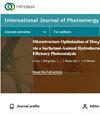光伏电池MPPT无电流传感器控制策略:基于能量的方法
IF 2.1
4区 工程技术
Q3 CHEMISTRY, PHYSICAL
引用次数: 0
摘要
提出并实现了一种新的基于能量的建模和控制策略,以解决光伏电池阵列与用电负荷连接时的最大功率点跟踪问题。提出了一个包含光伏电池阵列的能量转换级关键特性参数的数学模型,并使用端口-哈密顿框架进行了重新建模。该系统由输入输出电源端口对、存储和耗散元件组成。然后,设计了用于最大功率点跟踪的无电流传感器控制回路,该回路在能量转换器阶段起作用,并遵循基于互连和阻尼分配的无源策略。将该策略的性能与(经典)滑模控制律进行了比较。我们的基于能量的策略在采样率为122 Hz的硬件平台上实现,与其他最大功率点跟踪控制策略相比,动态功耗更低。数值仿真和实验结果验证了基于能量的建模方法和控制律方法的有效性。本文章由计算机程序翻译,如有差异,请以英文原文为准。
Current-Sensorless Control Strategy for the MPPT of a PV Cell: An Energy-Based Approach
A novel energy-based modelling and control strategy is developed and implemented to solve the maximum power point tracking problem when a photovoltaic cell array is connected to consumption loads. A mathematical model that contains key characteristic parameters of an energy converter stage connected to a photovoltaic cell array is proposed and recast using the port-Hamiltonian framework. The system consists of input-output power port pairs and storage and dissipating elements. Then, a current-sensorless control loop for a maximum power point tracking is designed, acting over the energy converter stage and following an interconnection and damping assignment passivity-based strategy. The performance of the proposed strategy is compared to a (classical) sliding mode control law. Our energy-based strategy is implemented in a hardware platform with a sampling rate of 122 Hz, resulting in lower dynamic power consumption compared to other maximum power point tracking control strategies. Numerical simulations and experimental results validate the performance of the proposed energy-based modelling and the novel control law approach.
求助全文
通过发布文献求助,成功后即可免费获取论文全文。
去求助
来源期刊
CiteScore
6.00
自引率
3.10%
发文量
128
审稿时长
3.6 months
期刊介绍:
International Journal of Photoenergy is a peer-reviewed, open access journal that publishes original research articles as well as review articles in all areas of photoenergy. The journal consolidates research activities in photochemistry and solar energy utilization into a single and unique forum for discussing and sharing knowledge.
The journal covers the following topics and applications:
- Photocatalysis
- Photostability and Toxicity of Drugs and UV-Photoprotection
- Solar Energy
- Artificial Light Harvesting Systems
- Photomedicine
- Photo Nanosystems
- Nano Tools for Solar Energy and Photochemistry
- Solar Chemistry
- Photochromism
- Organic Light-Emitting Diodes
- PV Systems
- Nano Structured Solar Cells

 求助内容:
求助内容: 应助结果提醒方式:
应助结果提醒方式:


